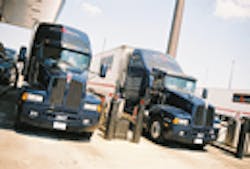A new analysis of federal legislation aimed at controlling carbon emissions projects that if the measures pass, the cost of gasoline could increase 15 cents per gallon on average, with diesel going up slightly less, between 2012 and 2019.
A study of the carbon dioxide (CO2) emission control provisions within the Senate’s Kerry-Boxer Bill – which draws heavily on the Waxman-Markey bill passed earlier this year in the House of Representatives – by research firm Point Carbon finds that such emissions would cost $15 per ton if a proposed cap-and-trade program is established.
Lisa Zelljadt, an analyst with Point Carbon, told FleetOwner that while trucking companies would not be covered directly by the proposed greenhouse gas emission restrictions, the refiners of diesel and gasoline would be covered. As a result, the cost of carbon allowances under an emission-trading system in the U.S. would most likely be passed on by refiners to their customers downstream in the form of fuel price hikes.
“Our breakdown of carbon- allowance pricing shows that $10 per ton equates to roughly a 10 cent per gallon increase for gasoline; an increase that would be roughly the same for diesel fuel,” she explained. “However, as you get on average more miles per gallon from diesel fuel compared to gasoline, that price increase due to any carbon allowance pass-through might be slightly less.”
Point Carbon, however, forecasts an average price of $15 per metric ton of carbon between 2012 and 2019, when the proposed cap-and-trade program would become active. As a result, gasoline fuel might see a 15 cent per gallon surcharge, with perhaps a slightly lower increase for diesel.
However, Zelljadt cautioned that the $15 per ton average could be lower or higher depending on a number of factors. “First, with economic activity lower than expected, the demand for carbon permits might fall as well – thus lowering the price of allowances,” she said. “But second, our model includes the effect of the proposed joint Environmental Protection Agency and Department of Transportation vehicle emission standards and the Senate’s 15% Renewable Electricity Standard (RES). If those policies don’t occur, then the price for allowances might rise.”
Zelljadt stressed, too, that certain segments of the trucking industry could participate in any future cap-and-trade program by creating specific “offset projects” that would offer demonstrable carbon emission reductions that could in turn qualify for trading credits.
“While trucking companies cannot participate directly in cap-and-trade, efforts such as ‘truckstop electrification’ might,” she said. “Truckstops are locations where large amounts of emissions are generated from idling trucks. If those emissions are measured and then subsequent reductions are measured, such projects could qualify for carbon allowances that could then be traded.”
About the Author
Sean Kilcarr
Editor in Chief
Sean Kilcarr is a former longtime FleetOwner senior editor who wrote for the publication from 2000 to 2018. He served as editor-in-chief from 2017 to 2018.
